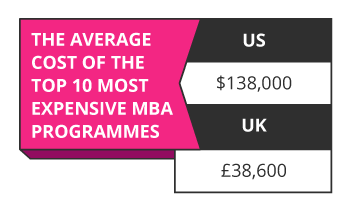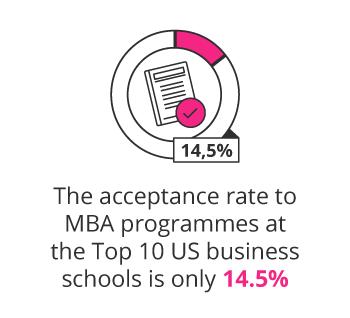Is an MBA Program Still Worth It in 2022?
Nearly 90 percent of employers said they plan to hire Master of Business Administration (MBA) graduates in 2021.1 Despite a global pandemic, and economic and political uncertainty, the demand for MBA-level business professionals continues to rise across industries.
“When thinking about the skills and experience required to help organizations and industries rebuild after an event like COVID-19, it makes sense that employers are expressing a desire to hire more MBA and business master’s graduates,” said Sangeet Chowfla, president and chief executive officer of the Graduate Management Admission Council (GMAC).2
An MBA can provide aspiring professionals with a diverse and comprehensive business toolkit that covers financial management, leadership strategy, and analytical thinking.3 But is an MBA worth it?
The downside of full-time MBA programs
Traditional MBA programs offer excellent opportunities to further your career, and gain practical and applicable skills. However, they do present barriers, such as:4
- High cost
- Time commitment
- Low acceptance rates
- The entrance exam
How much do MBA programs cost?
The cost of an MBA can vary significantly – depending on whether it’s full-time, part-time, or with a public or private school. Expenses range from around $60,000 to $160,000.5 This amount covers only the two years’ tuition fees – students will also need to consider accommodation, books, and the income lost while not working.

Because of the high costs and commitments associated with a full-time MBA degree, many professionals question whether getting an MBA is worth it. Fortunately, top universities have begun to cater to the need for MBA alternatives for full-time working professionals through online short courses.
How many people get accepted to MBA programs?
Owing to the limited number of spots available for MBA programs, the number of applications is always high, and the competition is intense. Nonetheless, according to the U.S. News, 69 percent of full-time MBA programs within the U.S. received more applications in the autumn of 2020, compared to the same period in 2019. Despite your interest in an MBA, you’re not guaranteed a spot – the acceptance rate for the 10 most selective full-time MBA programs is only 19 percent.6
Such low acceptance rates mean prospective MBA students need to be top performers. Preparatory short MBA courses provide a welcome alternative to the full program, and allow you to increase your eligibility for a full-time MBA program by improving your technical business skills.

What is the GMAT?
Used by most business schools as a screening test, the Graduate Management Admission Test (GMAT) helps you stand out during the admissions process. If you perform well on the exam, it indicates your commitment, motivation, and ability to succeed in business school. Letters of reference, past work experience, undergraduate grade point average (GPA), essays, and the interview all play a part in a school’s decision to accept you into their MBA program.7
While the GMAT can help you get into your dream business school, it can also prevent you from qualifying for the MBA program if you perform poorly.
With such barriers to enrollment in place, it makes sense to do everything possible to prepare for a full-time MBA or find an alternative learning path that teaches you the core MBA skills, without the time or financial commitment of a full-time degree.
Why an online MBA alternative is worth it
Apart from affording you valuable MBA skills to boost your application for a full-time MBA, preparatory MBA courses also offer insight into the commitment needed to complete a full-time MBA program and the type of classes you’ll be taking.
If you’re not aiming for a full-time MBA degree, but still wish to gain similar business and management competencies, then short MBA courses can ensure you gain the relevant knowledge.
Why you should consider studying an MBA alternative
MBA-based courses will help you gain many of the skills covered in a full-time MBA. These include the hard and soft skills needed to excel in today’s changing business environment.
Another option is the MBA Essentials online certificate course from the London School of Economics and Political Science (LSE). In just 10 weeks, this course enables business-minded professionals to acquire MBA-based skills for immediate on-the-job application. You’ll explore the three core pillars of business strategy: the strategic environment, the financial toolkit, and the human element. In addition, you’ll learn how to form business partnerships and influence people. Watch the course trailer to discover what, and from whom, you’ll learn the MBA essentials.
The future of the MBA
Full-time MBA programs are not a viable option for many working professionals, and so the need for alternative, accessible MBA programs continues to increase. Online education allows individuals to grow their professional skill sets in their own time, at a fraction of the cost, while still gaining the latest skills and industry insights. Soon enough, full-time MBA programs will be less of a must-have than many people think.
Explore an alternative MBA-based online course to gain valuable skills to maximize your competitive advantage
- 1 Nugent, T. (Sep, 2020). ‘MBA hiring set to rebound in 2021 after COVID-19 dip’. Retrieved from Business Because.
- 2 Nugent, T. (Sep, 2020). ‘MBA hiring set to rebound in 2021 after COVID-19 dip’. Retrieved from Business Because.
- 3 (Nd). ‘Why get an MBA? Practical, applicable skills’. Retrieved from The Princeton Review. Accessed November 10, 2021.
- 4 Hayes, A. (Jun, 2021). ‘When is an MBA worth it?’. Retrieved from Investopedia.
- 5 (2021). ‘MBA tuition fees (2020/2021): Calculating the cost of your studies’. Retrieved from MBA Today.
- 6 Kowarski, I. (May, 2021). ‘10 Business Schools with the lowest acceptance rates’. Retrieved from U.S. News.
- 7 (2021). ‘What is the GMAT?’. Retrieved from The Princeton Review.
